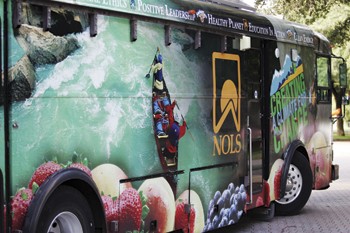
NOLS brought its biodiesel bus to campus Monday.
If you missed the giant bus on campus yesterday, don’t feel too bad.
The National Outdoor Leadership School (NOLS) Bus will be touring the country to raise awareness about the outdoors and alternative energy sources for the next two years, so chances are good you’ll see it again.
Last month the bus began the new “Creating a Climate for Change” campaign. In its last two-year tour, the bus racked up 50,000 miles during more than 200 visits to colleges, high schools and stores.
According to Riley Hopeman, a NOLS bus marketing rep who travels with the vehicle, the mission of the bus is threefold.
“We want to spread awareness about NOLS, raise awareness … about our main sponsor, and teach environmental ethics,” he said.
The bus uses a combination of recycled vegetable oil and solar power instead of gasoline.
“Depending on the cleanliness of the oil, we generally get between five to 10 miles per gallon – which is good for a bus this size,” said Hopeman.
Fellow marketing rep Curtis Tronolone said he hopes students make the connection between the bus and the NOLS wilderness schools.
In Alaska, for example, NOLS is trying to raise awareness about the drilling that’s going on in the Wildlife Refuge where it operates one of its programs.
He also said the Green River Valley in Utah, another NOLS site, could be subjected to drilling.
“One of the lessons we should learn from our current energy crisis [is that] we need to diversify where we get energy from,” said Tronolone.
According to the NOLS Web site, the bus is powered by a diesel engine that’s been altered to run on vegetable oil that can be gathered from leftover grease at restaurants.
The oil burned by the bus doesn’t emit sulfur dioxide (one of the main components about acid rain, emits 78 percent less carbon dioxide, 48 percent less carbon monoxide, and 80 percent less carcinogens than diesel.
The solar panels on the bus power the lights, computers and refrigerators, according to the Web site. The panels can store up to two days’ worth of power.
NOLS doesn’t just about raise awareness about energy sources, though. The center is known for its outdoor leadership programs, which Hopeman described as skills schools rather than survival schools.
“We teach people to live in the wild in ways that don’t get you in survival situations,” he said.
The company’s programs are held throughout America and the world, including India, Australia and the Amazon.
Junior Annie Durkin went on a trip to the Rockies this summer and described the experience as life changing.
“It was the best experience of my life,” she said.
Durkin, who now works for SMU’s Outdoor Adventures Program, said the 70-day trip motivated her to get more involved with the outdoors. She said she planned to lead Outdoor Adventure Center (OAC) trips and eventually like to work with NOLS before starting a career.
“The fun part is not having to talk to anyone in the outside world,” she said.
But that’s just a part of the objective.
“Our mission is that when you complete the course you’ll be comfortable enough to take family and friends and recreate in a way that’s comfortable, safe and ethical,” he said.








